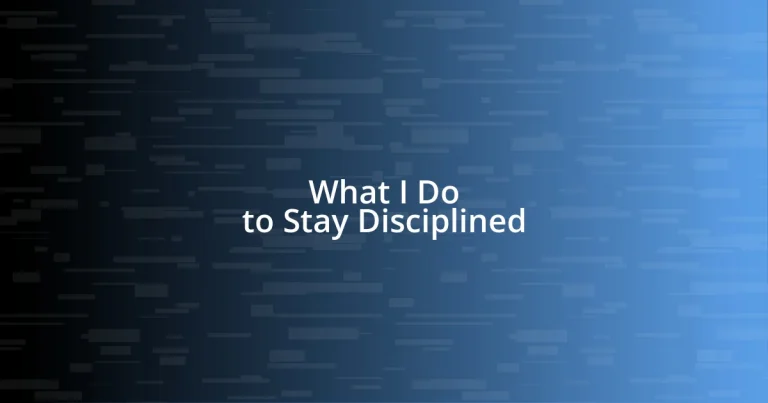Key takeaways:
- Understanding personal discipline involves balancing desire with commitment and creating an empowering environment that supports long-term goals.
- Setting clear, specific goals and regularly tracking progress enhances motivation and accountability, transforming vague aspirations into actionable plans.
- Accountability to others and periodic reflection on progress help maintain discipline while allowing for flexibility and growth in personal goals.
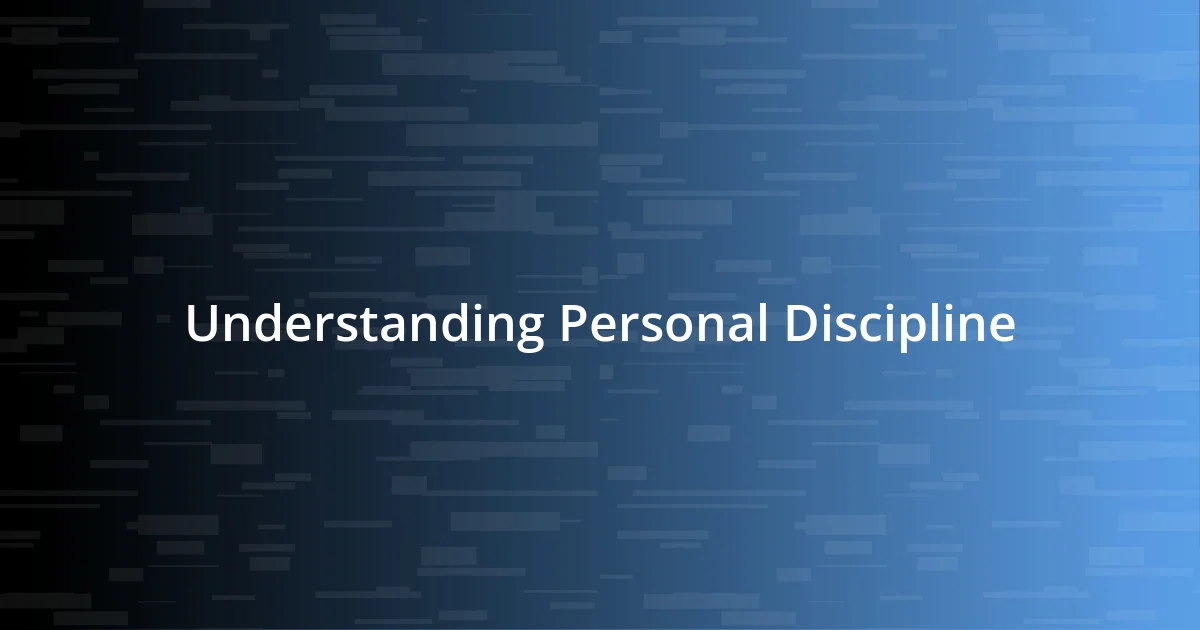
Understanding Personal Discipline
Personal discipline often feels like a dance between desire and commitment. I remember a time when I set out to train for a marathon. The initial excitement faded quickly, and I found myself asking, “Why am I putting myself through this?” Realizing that the discipline wasn’t just about the race, but about building resilience and pushing my limits, reignited my motivation.
Understanding personal discipline means recognizing the emotions tied to our goals. I’ve often felt the weight of distractions pulling me away from my aspirations, like that tempting call from friends to skip an evening of studying. I’ve learned to embrace those feelings rather than resist them, turning what once felt like struggle into an empowering choice aligned with my long-term vision.
When I reflect on my journey, I realize that discipline is not merely about strict rules but a flexible mindset. I strive to craft an environment that nurtures my goals, like creating a dedicated workspace free from clutter. Have you considered how your surroundings impact your ability to stay disciplined? For me, this intentional space has been a game-changer, anchoring my focus when temptation knocks.

Setting Clear Goals
Setting clear goals is foundational in keeping my discipline intact. I vividly remember the time when I was considering writing a book. Instead of just saying, “I want to write a book,” I broke that down into clear, smaller goals—like completing a chapter a week. This clarity not only provided direction but made the entire process less overwhelming.
It’s easy to feel lost without specific targets. When I first started my fitness journey, my goal of “getting fit” seemed abstract. However, when I transitioned to “running 5 kilometers in under 30 minutes within three months,” I noticed a significant shift. This goal gave me tangible steps to take every day, keeping me accountable and focused. What’s fascinating is how defining my goals magnified my motivation and transformed vague desires into actionable plans.
Moreover, I’ve learned the importance of revisiting and adjusting my goals. Life changes, priorities shift, and I’ve found that flexibility is key. For instance, I set a goal to learn a new language, but I realized my focus was too scattered on too many things. Adjusting my goal to “complete one language module each month” helped streamline my efforts and truly engage with that new language. Have you ever felt overwhelmed by your aspirations? Breaking them down into manageable parts can be liberating and motivating.
| Aspect | Vague Goals | Clear Goals |
|---|---|---|
| Direction | Lack of focus and uncertainty | Provides clear path and steps |
| Motivation | Can lose interest and drive | Encourages consistent progress and excitement |
| Adjustability | Hard to change without clarity | Easier to refine and adapt |
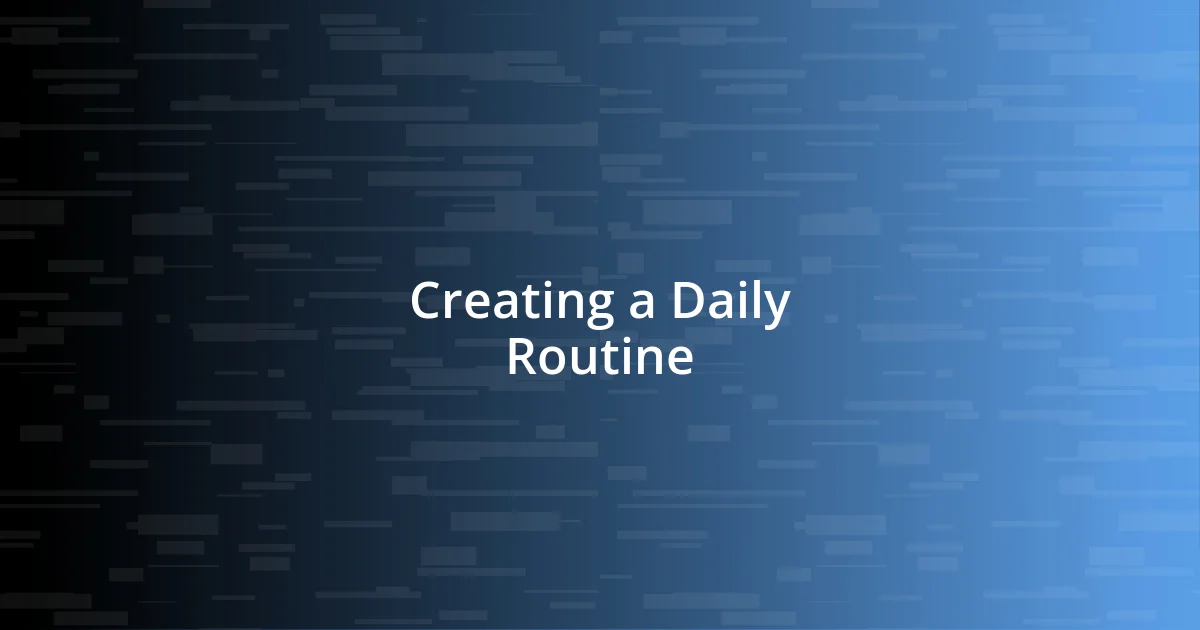
Creating a Daily Routine
Creating a daily routine has been vital to my discipline. I’ve found that establishing a structured plan helps me allocate time for my responsibilities and passions alike. When I first started my remote work journey, I struggled with the blurred lines between work and life. By setting clear time blocks for tasks, I discovered that having designated hours for work and personal projects significantly boosted my productivity.
To make this easier, I’ve developed a daily routine that I stick to as closely as possible:
- Morning: Wake up at 6:30 AM and enjoy a quiet cup of coffee while reviewing my goals for the day.
- Work Block: Designate uninterrupted work sessions between 9 AM and 12 PM for focused tasks.
- Lunch Break: Step away from my desk for at least half an hour to recharge and move.
- Afternoon: Schedule meetings and collaborative activities from 1 PM to 3 PM to maintain energy levels.
- Evening Wind Down: Dedicate time to relax or pursue hobbies, recognizing this quiet time is just as essential as my work.
Crafting this daily routine wasn’t easy at first; it required trial and error. I vividly remember days when I felt guilty for taking breaks or only got half my tasks done. However, I learned that balance is key. Having this routine has not only fortified my discipline but also transformed my mindset about productivity. It feels rewarding to end the day knowing I’ve adhered to my plan while still allowing space for spontaneity and leisure.

Developing Healthy Habits
Developing healthy habits has been a game-changer for me. I remember when I struggled with consistent exercise. Instead of dreading it as a chore, I shifted my mindset to view physical activity as a vital part of my day. I started taking short walks during lunch breaks, which not only boosted my mood but also helped me think more clearly. Isn’t it interesting how something as simple as stepping outside can elevate your day?
One habit I adopted is mindfulness in the morning. Rather than jumping straight into emails or social media, I take ten minutes to breathe deeply and set my intentions. This practice centers me and cultivates a sense of gratitude. I can’t tell you how much this small shift has altered my perspective. A simple question I often ask myself is: how do I want to show up today? This daily check-in keeps me grounded and focused as I navigate whatever the day throws my way.
Nutrition is another key aspect of my healthy habits. In the past, I often opted for convenience over health, leading to an energy slump. However, I started meal prepping on Sundays, which transformed my eating patterns for the week ahead. Ensuring I have wholesome meals ready to go saves me from those late-night snack temptations. Have you ever felt the difference between a home-cooked meal and fast food? The clarity and energy I’ve gained from nourishing my body properly are undeniable. Ultimately, developing healthy habits isn’t just about discipline; it’s about enhancing my quality of life.
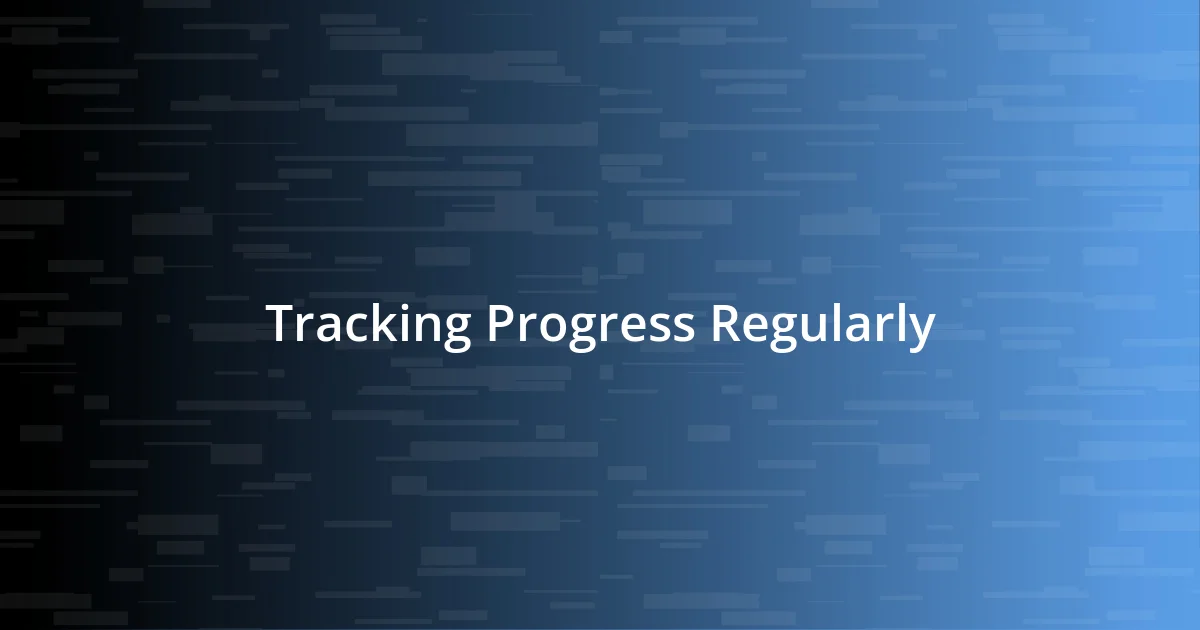
Tracking Progress Regularly
Tracking my progress regularly has become one of the cornerstones of my discipline. I’ve noticed that when I take a moment to reflect on my achievements, no matter how small, it boosts my motivation. For instance, after a particularly challenging week, I set aside some time on Sundays to review my accomplishments. It’s like giving myself a pat on the back! Have you ever felt that rush of pride looking back at what you’ve done?
Using simple tools like journals and apps helps me visualize this progress. I remember the excitement I felt when I first started tracking my workouts. By logging each session, I could literally see my growth over time, which spurred me to push harder. It’s fascinating how seeing numbers can create a tangible sense of accomplishment. Just the other day, I updated my fitness app and couldn’t believe how far I’ve come—what a reminder that persistence pays off!
Sometimes, I also share my progress with close friends or colleagues. This practice not only holds me accountable but encourages me to reflect on my journey. Have you ever shared your goals with someone? When I do, it opens a space for feedback and inspiration. Recently, I discussed my discipline journey with a friend, and hearing their perspective motivated me to step up my game. Tracking progress isn’t just about numbers; it’s about connection and growth, and that’s something I cherish deeply.
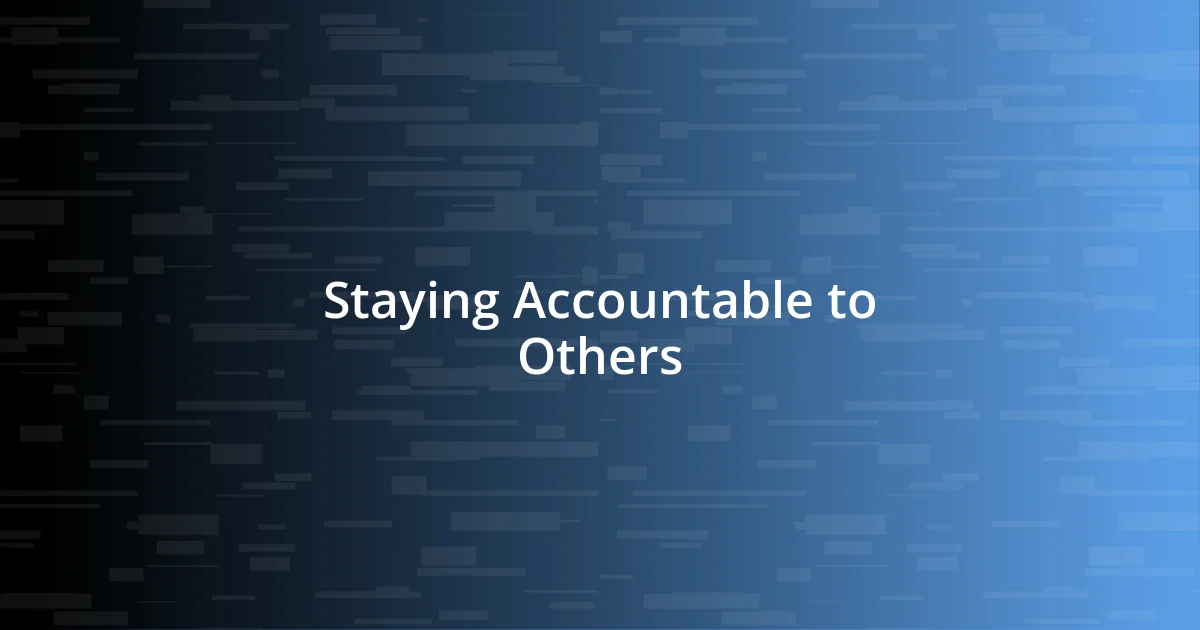
Staying Accountable to Others
Staying accountable to others has been a transformative experience for me. I often share my goals with a small circle of friends who understand my journey. One time, I told them I wanted to read one book a month, and the encouragement I received was incredible! Each time I met up with them, they asked about my progress, and it kept that fire within me burning bright. Can you imagine that kind of motivation?
I also joined a workout group where we check in weekly. At first, it felt a bit daunting to expose my struggles, but being surrounded by like-minded individuals created a supportive atmosphere. Just last month, I found myself sharing how I overcame fatigue to finish my morning routines. Hearing their stories and triumphs reminded me that we’re all in this together. Isn’t it comforting to have a support system?
Moreover, I believe accountability can come from unexpected places. For example, I started posting my monthly goals on social media. The light-hearted comments and “cheers” from my followers have pushed me to stay committed. When someone asks, “How’s that reading challenge going?” it’s almost impossible to say, “Oh, I gave up.” Connecting with others makes the journey less solitary and immensely rewarding. Have you ever felt that sense of community fuel your ambitions?

Adapting and Reflecting Periodically
Reflecting on my progress isn’t just a one-off task; it’s an ongoing conversation with myself. I often find that sitting quietly, perhaps with a warm cup of tea, allows me to really dive into what’s working and what’s not. Once, I spent an afternoon reviewing my goals, and while some felt stagnant, others had flourished immensely. Do you ever feel like some areas of your life are thriving, while others need that extra push?
Sometimes, I make changes on the fly. I remember a month when I was struggling to balance work and exercise. Instead of pushing through a rigid schedule, I adjusted my workout times based on my energy levels. The freedom I felt after letting go of that pressure was eye-opening. Have you ever tried to align your habits with your natural rhythms? It made me realize that discipline isn’t just about sticking to a plan; it’s about flexibility and growth.
To enhance my reflections, I’ve started asking myself deeper questions. For instance, what genuinely inspires me? This simple yet profound inquiry has reshaped my approach to discipline. By recalibrating my priorities and focusing on meaningful goals, I’ve created a more fulfilling path. It’s like tuning an instrument—you don’t just play the notes; you ensure they resonate with your intent. How often do you take the time to reflect on what truly matters to you?












